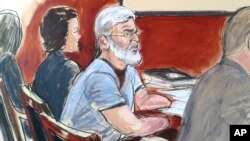NEW YORK —
A jury has been chosen in the New York terror trial of a radical Islamic cleric, Mustafa Kamel Mustafa, also known as Abu Hamza al-Masri.
Abu Hamza, who is Egyptian, was extradited from Britain to the U.S. in 2012 after serving a seven-year prison sentence for inciting murder and racial hatred there. He is charged with conspiracy to take hostages in Yemen, with sending intermediaries to organize a terrorist training camp in the U.S., and with providing material support to the Afghan Taliban, a recognized enemy of the U.S. He has pleaded not guilty.
In the Yemen hostage-taking, Abu Hamza is accused of involvement in the 1998 kidnapping of 16 tourists in order to force the release of prisoners being held by Yemen. Four hostages were killed when the kidnappers used them as human shields during the Yemeni military’s rescue attempt. Several others, including an American, were injured.
The indictment says Abu Hamza knowingly provided a satellite phone and airtime to the hostage-takers, spoke with them from Britain while the plot was under way, and offered to act as their intermediary.
He is charged with conspiring to stockpile weapons and ammunition to al-Qaida to establish a jihadist training camp in the northwestern U.S. state of Oregon in 1999. The charges of material support and resources to terrorists in Afghanistan are tied to alleged acts in 2000 and 2001.
Abu Hamza, who is blind in one eye and who lost both hands reportedly while fighting the Soviet occupation of Afghanistan, told Judge Katherine Forrest last week that he intends to testify in his own defense.
Bernard Freamon, a professor of law at New Jersey's Seton Hall University and an expert on Islam, said that could be risky, but may be part of Abu Hamza’s strategy for advocating jihad.
“Sometimes these defendants want to use, even the trial is part of the program of generating support for their cause," he said. "So, he may have an idea that he could use the trial, especially by testifying in his own defense, to try to advance the bona fides of his particular cause, which I disagree with, by the way. I think his view of jihad is not supported by the religion or any rational interpretation of the texts.”
Abu Hamza faces life in prison if convicted. His trial begins just weeks after another radical Islamic cleric, Sulaiman Abu Ghaith, was convicted on terrorism charges in New York.
Abu Hamza, who is Egyptian, was extradited from Britain to the U.S. in 2012 after serving a seven-year prison sentence for inciting murder and racial hatred there. He is charged with conspiracy to take hostages in Yemen, with sending intermediaries to organize a terrorist training camp in the U.S., and with providing material support to the Afghan Taliban, a recognized enemy of the U.S. He has pleaded not guilty.
In the Yemen hostage-taking, Abu Hamza is accused of involvement in the 1998 kidnapping of 16 tourists in order to force the release of prisoners being held by Yemen. Four hostages were killed when the kidnappers used them as human shields during the Yemeni military’s rescue attempt. Several others, including an American, were injured.
The indictment says Abu Hamza knowingly provided a satellite phone and airtime to the hostage-takers, spoke with them from Britain while the plot was under way, and offered to act as their intermediary.
He is charged with conspiring to stockpile weapons and ammunition to al-Qaida to establish a jihadist training camp in the northwestern U.S. state of Oregon in 1999. The charges of material support and resources to terrorists in Afghanistan are tied to alleged acts in 2000 and 2001.
Abu Hamza, who is blind in one eye and who lost both hands reportedly while fighting the Soviet occupation of Afghanistan, told Judge Katherine Forrest last week that he intends to testify in his own defense.
Bernard Freamon, a professor of law at New Jersey's Seton Hall University and an expert on Islam, said that could be risky, but may be part of Abu Hamza’s strategy for advocating jihad.
“Sometimes these defendants want to use, even the trial is part of the program of generating support for their cause," he said. "So, he may have an idea that he could use the trial, especially by testifying in his own defense, to try to advance the bona fides of his particular cause, which I disagree with, by the way. I think his view of jihad is not supported by the religion or any rational interpretation of the texts.”
Abu Hamza faces life in prison if convicted. His trial begins just weeks after another radical Islamic cleric, Sulaiman Abu Ghaith, was convicted on terrorism charges in New York.




